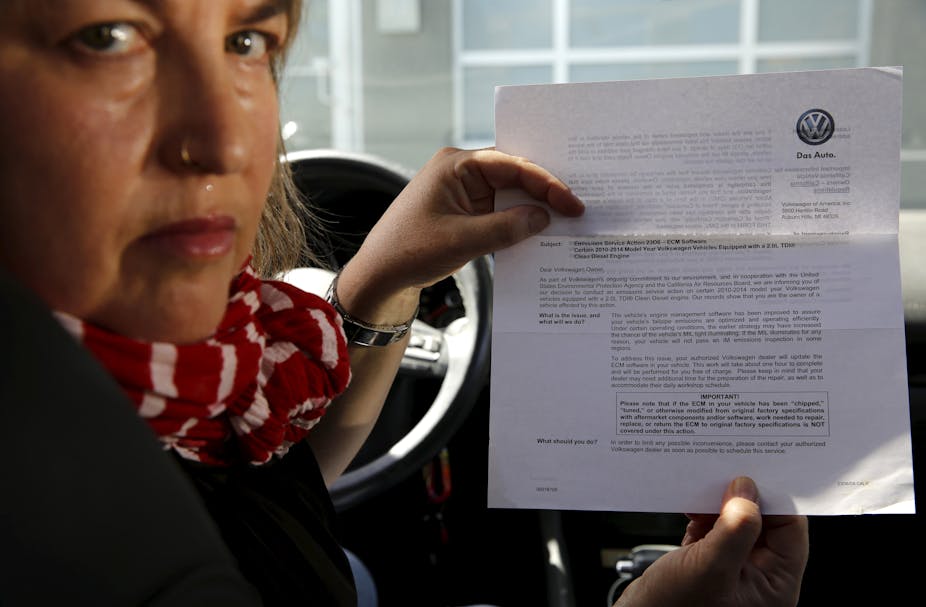Over the years, we’ve seen quite a few scandals in the automotive industry. However, the recent one at Volkswagen sets the bar at a whole new level. This isn’t your garden variety crisis involving a mechanical or safety issue.
While many of those (think Toyota and accelerator pedals) have been huge, the VW scandal involves years of deception to the public, and there are currently more questions than answers. It’s not unreasonable to ask if VW can survive this. In the weeks and months ahead, it faces a raft of questions that will greatly influence its fate.
Public trust
The company has recalled 11 million diesel cars worldwide, but what is the actual solution? The company will remove the software that cheated on emissions tests, but can it make the cars perform as promised during actual driving conditions? If not, how will it adjust its marketing message about those cars? As for the environment, what will it do about the revelation that those cars produced as much as 40 times the allowed amount of nitrogen oxide, a pollutant linked to asthma and other respiratory problems?
Other companies will have to address questions related to this crisis too. For example, automotive manufacturers of diesel cars face the prospect of random emissions audits to ensure they don’t have similarly deceptive software installed. Those companies are surely wondering if the public mistrust of VW is contagious and will spread to all diesel cars. If so, then the diesel industry could also experience fallout.
Perhaps the biggest question – and one that must be addressed head-on for the sake of long-term survival – is whether VW will be able to rebuild public trust. After all, the deception at VW apparently went on for six years. That is remarkable!
Everyone is now asking what happened. How could this level of deception have existed for so long, much less at a German company known for its attention to detail, skilled engineering and commitment to the environment?
Damaged goods
While the resignation of VW CEO Martin Winterkorn was probably inevitable, the new CEO will have to manage one of the most in-depth and thorough investigations ever seen in the automotive industry.
There are two scenarios that are likely to be uncovered. First, it could turn out that middle managers found the task of creating a cleaner diesel car too challenging. Instead of admitting this, they came up with software to make it appear as if they were successful. The other scenario involves senior executives directing the company to do whatever it took to lower emissions reports and looking the other way when it came to the software.
While Winterkorn will be the most senior leader to leave, he certainly won’t be the last. It will be interesting to see whether those that follow are middle managers, senior executives or a combination of both.
In terms of moving forward, VW is going to need a massive focus on public relations. It must be absolutely transparent and cooperative throughout this process. People need to understand how this happened and be assured that it will not happen again. People who own these cars need to be assured they will be fixed during the recall. And going forward, if these cars continue to be produced, VW will have to mount one heck of a marketing campaign to convince buyers that its cars meet the environmental standards stated.
VW is in a precarious position, and it’s not clear what will happen. So far, the company has stated that it will spend around US$7.3 billion for the recall efforts and related activities. The final figure will more likely reach $10 billion or more.
However, criminal and regulatory investigations could continue for years in countries around the world. It’s already projected that fines from the Environmental Protection Agency in the US alone could reach $18 billion. Financial stability is going to be a big issue for the company.
Echoes of financial crisis
In terms of finding comparisons, we haven’t really seen anything of this scale in the automotive industry before. There have certainly been safety and mechanical recalls – some of them initiated after fatalities – at manufacturers like GM, Toyota and others around the world.
However, those safety issues weren’t covered up for six years. Instead, once the issues were identified, the companies recalled the vehicles, fixed them and began the process of rebuilding trust. VW’s issues are trickier because consumers may always be concerned about whether the emissions information reported is really accurate.
The VW scandal may be more akin to what happened with the big banks during the financial crisis. While this isn’t going to lead to the collapse of the automotive industry, it will surely lead to a lot more scrutiny on the part of regulators and consumers as well as lingering public distrust.
The big lesson here is that deception never pays in the long run. Inevitably, it is the company that engages in deceit that pays – and in this case will pay significantly.

